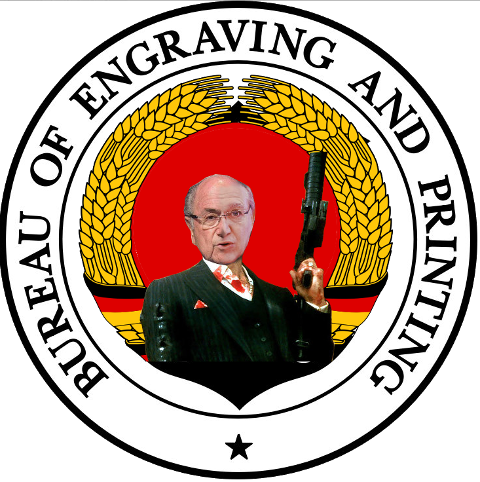

Reference: Bureau of Engraving and Printing
A FEW months ago EPO staff complained that the bosses treat the Office not like a patent office (which needs to be careful and selective in granting monopolies) but like a cash cow or investment bank that's now essentially printing patents like some shady central banks print money. The USPTO now better understands the importance of scarcity in patents (expect grants to decline this year); people whom I speak to (professors nearby) joke about how rubbish (low-quality) patents they managed to sneak into the US. Even patents on purely fictional things.
"It's another very considerable increase (not the first) that can discourage appeals, whereas applications got cheaper so as to help Battistelli game the numbers (after they declined)."We assume that pretty much everyone at the EPO (except Team Battistelli) would agree that patent quality is declining at the Office, which now strives only to enrich itself (at least in the short term) rather than deal with proper patent examination. Staff that does not agree gets punished.
Yesterday we saw this new article from Sanam Habib and Hazel Ford of Finnegan, Henderson, Farabow, Garrett & Dunner LLP (Finnegan for short). Finnegan and IAM work together towards patent maximalism; they're patent maximalists, so surely they see nothing wrong with the EPO's approach. More litigation is something they would profit from. This means that they would rather deal with bad patents in the courtrooms, not at the Office.
We recently wrote about an increase from €1880 to €2255 for appeals. It's another very considerable increase (not the first) that can discourage appeals, whereas applications got cheaper so as to help Battistelli game the numbers (after they declined). It echoes a similar move in the US, which very recently adapted fee hikes for IPRs at PTAB (the number of filings still increases nonetheless, as we noted a few days ago).
The changes are due in 2 weeks and here is what Finnegan wrote:
The EPO has announced a number of changes in its official fees, mostly having effect from 1 April 2018. The majority of the fees remain unchanged; however, Applicants will see a mixture of increases and decreases amongst the selected changes. Some of the more important changes are reviewed below.
[...]
As of 1 April 2018, the EPO’s appeal fee will increase from €1,880 to €2,255 for larger companies. However, the current, lower fee amount will still apply if the appeal is filed by an individual, small or medium sized enterprise, university, public research organisation, or non-profit organisation.
As part of the maintenance of pending European patent applications, annual renewal fees are charged by the EPO. These fees are due at the end of the month containing the anniversary of the filing date. The first fee to be paid is the third year renewal fee, due at the end of the month containing the second anniversary of the filing date.
Since 2009, the EPO has not permitted renewal fees to be paid more than three months before the due date. Payments made earlier are not valid and will be refunded by the EPO, except when paid shortly before the permissible prepayment period. For Euro-PCT applications, it has therefore been common for the third year renewal fee payment window to open after the 31 month time limit for entering the European regional phase. This restriction is applied by the EPO to prevent Applicants from making multiple payments in advance thereby avoiding future increases in fees.
However, with effect from 1 April 2018, the payment window for the third year renewal fee is being extended. It will now be possible for Applicants to pay the third year renewal fee up to six months before it falls due. This change means that, in most cases, Applicants will now have the opportunity to pay the third year renewal fee at the same time they bring a PCT application into the regional phase in the EPO.
"...the management of the EPO commits institutional suicide; it makes patents cheaper while making examinations a lot poorer (in terms of quality) and makes appeals a lot more expensive in order to leave bogus patents in tact, in effect masking the effect of quality declines."Battistelli is passing the cost to the public by allowing mass-granting of patents in error. Where is the uproar? Basically, litigation like this would be a tax on everyone; sometimes threats of litigation alone (the modus operandi of patent trolls).
In our view (which is shared among many EPO employees), the management of the EPO commits institutional suicide; it makes patents cheaper while making examinations a lot poorer (in terms of quality) and makes appeals a lot more expensive in order to leave bogus patents in tact, in effect masking the effect of quality declines. ⬆